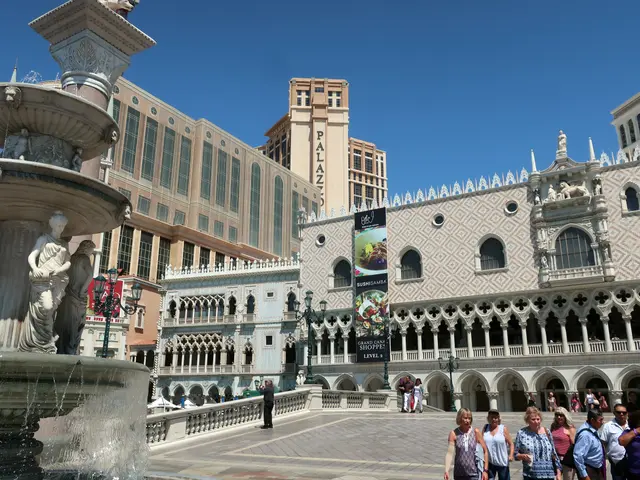Decrease in Casino Earnings on Las Vegas Strip During February Due to Challenging Revenue Comparisons
Despite a significant 14% decrease in gross gaming revenue (GGR) on the Las Vegas Strip in February 2025, the outlook for the city's gaming market remains cautiously optimistic. This optimism is grounded in several factors, including the strengthening of non-gaming revenues, the expansion of the convention business, and the growth potential in high-end and digital gaming segments.
The decline in GGR can primarily be attributed to the absence of the Super Bowl, which was held in Las Vegas in February 2024, and the fact that February 2025 had one less day compared to the previous year (Leap Year). Barry Jonas, an analyst from Truist Securities, has confirmed that the softer GGR was primarily due to these factors, as well as the declines in visitor volume and gaming revenue mentioned earlier.
Visitor volume in Las Vegas dropped 12% in February, with approximately three million guests, while hotel occupancy was 3.4% lower. Las Vegas hotel nightly room rates on the Strip also crashed 26% to below $200. The Tropicana has been demolished, and The Mirage is being renovated by Hard Rock International, resulting in roughly 4,500 fewer rooms on the Strip.
However, these challenges are being offset by some positive developments. The convention business in Las Vegas is strengthening, with the Las Vegas Convention Center undergoing a large $600 million renovation. This expansion is expected to boost group meeting and trade show attendance in 2026 to potentially record levels. Non-gaming revenues, such as entertainment, food & beverage, continue to flourish, supporting overall earnings despite gaming headwinds.
Major operators like Caesars Entertainment are benefiting from renovated properties attracting high-end customers and a growing digital gaming segment with promising iGaming potential. Caesars is also focused on reducing debt and improving financial flexibility, positioning itself to navigate current market challenges.
Despite these positives, the outlook is tempered by ongoing economic uncertainties, such as inflation and consumer spending pressures, and increasing competition, especially in digital gaming. Regulatory changes also pose potential challenges to profitability for Las Vegas operators.
In summary, while Las Vegas gaming revenues have faced a recent downturn, the broader market outlook remains cautiously positive due to improving non-gaming revenues, convention business expansion, and opportunities in high-end and digital gaming segments. Operators are actively managing debt and capital projects to position for a recovery, but macroeconomic pressures and competitive challenges will require careful navigation through 2025 and beyond.
Many on social media have criticized Las Vegas for becoming out of touch with ever-increasing resort fees, costly cocktails, poor odds like 6:5 blackjack, and the continued elimination of perks and comps. There are also growing anxieties across Southern Nevada that a tightening economy, possibly caused by President Donald Trump's tariffs war, could be making Las Vegas less attractive to the general public.
Despite these concerns, analysts like Barry Jonas expect to see improvements in March for the gaming capital of Las Vegas. Slot machines on S. Las Vegas Blvd. had a revenue of $381.9 million, which is the same as the previous year. Overall, the decline in GGR was driven by declines in baccarat, table games, and one less calendar day. Baccarat GGR saw a decrease of more than half from the previous year due to a 31% decrease in money wagered and a weaker hold.
As the city navigates these challenges, it continues to be a global leader in entertainment, hospitality, and gaming, with a resilient and adaptive industry ready to face the future.
- The decline in Gross Gaming Revenue (GGR) on the Las Vegas Strip in February 2025 was primarily due to the absence of the Super Bowl, fewer days, and lower visitor volume.
- Barry Jonas, an analyst from Truist Securities, has confirmed that these factors, along with declines in gaming revenue, were predominant causes of the softer GGR.
- Despite the decrease in GGR, the outlook for the city's gaming market remains cautiously optimistic, with strengthening non-gaming revenues and the expansion of the convention business.
- The Tropicana has been demolished, and The Mirage is being renovated, resulting in approximately 4,500 fewer rooms on the Strip.
- Operators like Caesars Entertainment are benefiting from renovated properties attracting high-end customers and a growing digital gaming segment with promising iGaming potential.
- In the face of ongoing economic uncertainties, increasing competition, and regulatory changes, operators are actively managing debt and capital projects to position for a recovery.
- Many on social media criticize Las Vegas for increasing resort fees, costly cocktails, poor odds, and the elimination of perks and comps, raising concerns about the city's appeal in a tightening economy.
- Despite these criticisms and potential challenges, analysts like Barry Jonas expect to see improvements in March for the gaming capital of Las Vegas, with similar slot machine revenues compared to the previous year. Baccarat, table games, and the fewer calendar days were the main contributors to the decline in GGR.








